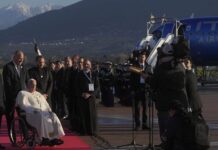In anticipation of Donald Trump’s return to the White House, the European Union is taking the first steps to craft a unified strategy.
Donald Trump is back.
That’s the new reality the European Union faces since American voters went to the polls and granted the Republican a stronger-than-expected victory, sweeping the seven battleground states that were up for grabs.
Trump’s return to the White House was not exactly an earth-shattering surprise for Brussels, as opinion polls had suggested an impossibly tight race where any outcome was possible. Still, the comeback of a man with such aversion to the multilateral system at a time when the world is beset by brutal wars makes officials and diplomats sweat.
How should the EU navigate these troubled waters?
So far, nothing has been set in stone, no common line has been agreed and no policy document has been published. The work is still in flux and could take up to a few months, before it becomes a unanimous, settled strategy.
However, an informal summit in Budapest last week and the confirmation hearings of the nominees to be European Commissioners offered the first clues on how the EU intends to cope with the second Trump administration.
Here’s what we know.
Let’s talk
Despite the bruising experience with the first Trump presidency, the EU wants to give the president a new chance. The reason is self-evident: America is too big, too important, to sweep under the carpet and pretend like nothing is going on. Crucially, it is also Europe’s most long-standing ally and its main security provider.
“The European Union needs the United States, and only through enhanced cooperation can we meet the common challenges,” Cyprus President Nikos Christodoulides said while attending the meeting in Budapest.
Luxembourg’s Prime Minister Luc Frieden struck a similar note and called on the EU to develop a “friendly partnership” without giving up its principles. Frieden also urged moderation in the debate as Trump’s foreign agenda was still up in the air.
“We will now have to see what exactly President Trump will do, once he becomes president, whether he will apply everything that he has said during the election campaign, but a lot it’s still very vague,” Frieden said. “So let’s talk to him, let’s listen to him, and then we need to adapt with a strong European collective answer.”
EU leaders from across the political spectrum agree that dialogue is paramount to ensure the time-honoured alliance survives Trump’s uncompromising “American First” mindset, which is directly at odds with the bloc’s deep-rooted dedication to the rules-based order.
During her confirmation hearing, Kaja Kallas, who is poised to be the bloc’s foreign policy chief, promised to make the EU’s voice heard on the global stage amid the cacophony.
“Isolationism has never worked well for America,” Kallas told lawmakers. “My intention is that Europe is around those tables when anything about Europe is discussed, that we’re not left out, that we have a say.”
Let’s deal
The EU is under no illusion that talking alone will solve all the bumps on the road.
Brussels, and the other capitals, are aware of Trump’s notoriously transactional approach to diplomacy, which some of them suffered firsthand in his first term.
Denmark’s Mette Frederiksen made headlines in 2019 when she rebuffed Trump’s proposal to buy Greenland as “absurd,” unleashing the billionaire’s wrath. Now, with a world up in flames, both are set to work together again.
“We have to convince all Americans that we need no conflicts between us, no matter the issues we’re discussing, including trade,” Frederiksen said in Budapest.
Trade will be one of the main battle lines between the two sides of the Atlantic.
Evoking a glorified image of America’s 1890s, Trump has repeatedly threatened to impose 10% tariffs on every import coming into the country. The measures, if ever introduced, could wreak untold havoc across the EU, an export powerhouse that relies heavily on global trade to grow and compensate for its sluggish domestic demand.
Simon Harris, Ireland’s Prime Minister, believes that appealing directly to Trump’s corporate instincts could be a way to appease his protectionist instincts and make him realise that America has more to lose than to gain from untested tariffs.
“President Trump is a businessman, he’s somewhat transactional and I think he will understand that the relationship in terms of trade is a two-way relationship,” he said.
“We need to be aware that the risk of a transatlantic trade shock has now increased. That is a statement of fact, we need to walk our way through these things,” Harris added.
Ursula von der Leyen, an ardent believer in the EU-US bond, has suggested discussing “common interests” with the White House to “then go into negotiations.”
Her first pitch? Buy more American LNG.
“We still get a whole lot of LNG via Russia, from Russia,” she said in Budapest. “And why not replace it with American LNG, which is cheaper, and brings down our energy prices?”
Von der Leyen and the European Commission, which has exclusive competence to set the bloc’s commercial policy, will be at the wheel of the closed-doors efforts to offer Trump a deal that is sweet enough to change his mind.
The stage is set for an all-out clash: last month, the Republican warned the “lovely” EU would pay a “big price” for its consistent trade surplus with America.
Let’s strengthen
The EU strategy going forward will be a lot about Trump but also a lot about the EU itself.
His first mandate left the bloc leaking its wounds. French President Emmanuel Macron took it upon himself to promote the concept of “strategic autonomy” to make the EU less dependent on global partners and more resilient against external shocks. Macron’s thinking eventually became mainstream and inspired legislative proposals to, for example, ramp up homegrown green tech and microchip production.
The big focus will be on defence. Trump has said he would “encourage” Russia to do “whatever the hell they want” with European countries that fail to meet NATO’s spending targets and pledged to revise military and financial aid to Ukraine, which could leave the war-torn nation without the much-needed advanced weapons from America.
This worst-case scenario weighs on EU leaders as they prepare for the next four years.
“We need to be quite realistic as Europeans – we cannot approach this transatlantic alliance from a position of weakness,” said Greek Prime Minister Kyriakos Mitsotakis. “Europe cannot change the world. But it can certainly change itself to cope with the changing world and hence the discussion we will have.”
His Polish counterpart, Donald Tusk, declared that “the era of geopolitical outsourcing is over” while Italy’s Giorgia Meloni, whose hard-right ideology shares certain similarities with Trump’s worldview, said she was “absolutely convinced” that Europe would be able to guarantee its “independence” and invest more in defence.
“Don’t ask yourself what the United States can do for you, ask yourself what Europe should do for itself,” Meloni said, reinventing John F. Kennedy’s iconic quote.
Most EU leaders agree that, whatever course America takes, the bloc must remain firmly by Ukraine’s side to contain Vladimir Putin’s expansionism. A notable exception is Hungary’s Viktor Orbán, who has pushed for a quick ceasefire to enable negotiations with Russia – only to have his words dismissed by Volodymyr Zelenskyy as “nonsense.”
Dr Luigi Scazzieri, a senior researcher at the Centre for European Reform (CER), believes EU leaders are trying to “project unity and avoid a descent into a scramble.” But that unity, he cautioned, could fall apart if the common strategy to cope with Trump ends in failure and capitals seek tailor-made deals, undermining Brussels along the way.
“When it comes to diplomatic unity over issues like China or Ukraine, the challenge is that some members, like Italy or Hungary, think that they have a privileged channel to Trump, and therefore may be difficult to keep onboard,” Scazzieri told Euronews.
In the face of an unpredictable, unruly White House, some choose to see a silver lining. Trump’s comeback brings “possible problems” but also “possible opportunities,” argued Sweden’s Ulf Kristersson, urging Europe to step up its military expenditure.
Macron, whose end-of-presidency legacy could be easily defined by what Trump does next, framed the question of defending Europe’s interests as an epoch-making test.
“It must be neither in a naive transatlanticism, nor in questioning our alliances, nor in a narrow nationalism that would not allow us to take up this challenge against China and the United States of America,” Macron told fellow leaders in Budapest.
“This is a historic moment for us, Europeans, that is decisive.”












